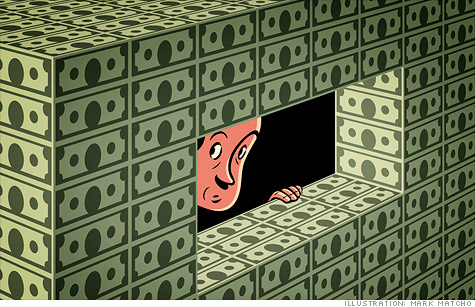Search News

FORTUNE -- After shedding almost a third of its value over the past decade, the U.S. dollar has exhibited a few sparks of its former glory in recent months. Spooked investors have moved back into the greenback amid fears that Europe's debt crisis could turn into a full-blown meltdown. But beware, say many experts: The surge is merely a blip in a weak-dollar trend that still has years to run. And that argues for parking at least a modest portion of your savings in foreign currencies with more solid fundamentals.
To be sure, the dollar is still viewed as the world's "safe haven" currency. But deep-rooted problems are undercutting its status. The federal deficit and debt burden are ballooning. Trade imbalances with emerging countries are gaping wider. Meanwhile, to spur growth, the Federal Reserve has effectively been printing new money, diluting the value of each existing buck. "The U.S. is basically bankrupt," says Laurence Kotlikoff, an economics professor at Boston University. "I think we'll see a major decline in the dollar over time."
To hedge against the possibility of a falling greenback, consider putting about 5% or so of your savings into foreign currencies. The safest strategy is to buy a basket of currencies. That way you avoid being blind-sided by the political or economic agenda of any one country. In recent weeks, for instance, both the Japanese yen and the Swiss franc have taken sharp hits against the U.S. dollar after the governments stepped in to prevent their currencies from appreciating.
A simple way to establish a foreign currency position is through one of the dozens of exchange-traded funds devoted to currencies. The PowerShares DB U.S. Dollar Index Bearish (UDN), for example, tracks the performance of a basket of developed-country currencies against the U.S. dollar and can serve as a "cheap hedging instrument" within your portfolio, says Michael Rawson, an ETF analyst with Morningstar.
Another relatively low-cost option worth considering is an ETF that specializes in foreign government bonds. In addition to capturing any price appreciation if the dollar weakens, you'll also reap some income. For instance, WisdomTree Emerging Markets Local Debt (ELD) tracks a portfolio of government bonds from 15 emerging-market countries, including China, Brazil, and South Korea.
Or you could simply park some of your money in a U.S. bank account that offers foreign currency investments. EverBank, for example, offers short-term certificates of deposit denominated in baskets of foreign currencies. The CDs are FDIC-insured and pay interest based on the rates prevailing in each relevant country. EverBank also offers deposit accounts in foreign currencies.
A sustained drop in the U.S. dollar is not a sure bet. But given the impact that such a decline would have on the purchasing power of your savings, moving a little money into foreign currencies is a sensible insurance policy.
--A former compensation consultant, Janice Revell has been writing about personal finance since 2000.
This article is from the December 12, 2011 issue of Fortune. ![]()

Carlos Rodriguez is trying to rid himself of $15,000 in credit card debt, while paying his mortgage and saving for his son's college education.
| Overnight Avg Rate | Latest | Change | Last Week |
|---|---|---|---|
| 30 yr fixed | 3.80% | 3.88% | |
| 15 yr fixed | 3.20% | 3.23% | |
| 5/1 ARM | 3.84% | 3.88% | |
| 30 yr refi | 3.82% | 3.93% | |
| 15 yr refi | 3.20% | 3.23% |
Today's featured rates: